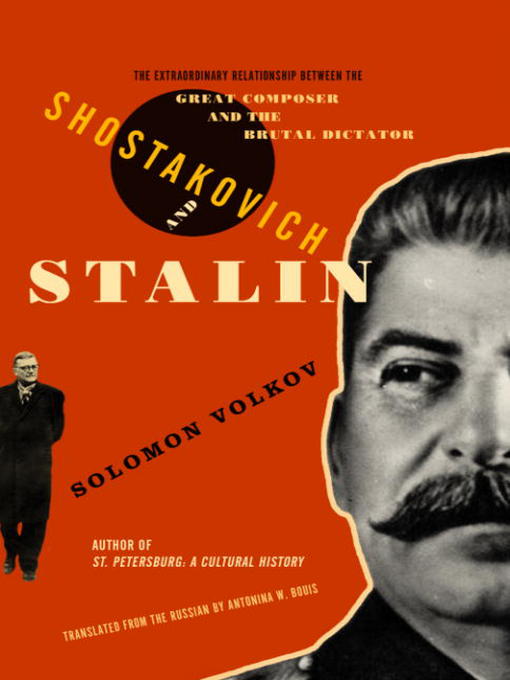
Shostakovich and Stalin
The Extraordinary Relationship Between the Great Composer and the Brutal Dictator
کتاب های مرتبط
- اطلاعات
- نقد و بررسی
- دیدگاه کاربران
نقد و بررسی

February 2, 2004
Shostakovich's tortured relationship to the Soviet authorities was a main subject of Testimony
, a book published after the composer's death by Volkov, who claimed that it contained Shostakovich's own remembrances. Controversy about the authenticity of Testimony
swirled for years, until the publication in 1999 of Laurel E. Fay's Shostakovich: A Life
, accepted by many scholars as decisively countering Testimony's
claims to accuracy. The appearance of a new study by Volkov on Shostakovich (1906–1973), then, is sure to raise critical hackles. Volkov argues that Shostakovich survived the denunciation of his 1934 opera Lady Macbeth of Mtensk
, and more minor controversies thereafter, in part by relying on a Russian tradition of playing the "holy fool" when under political pressure. When Stalin asked that Shostakovich henceforth submit operas and ballets for approval, the composer solved the problem by refraining from writing these musical forms. Volkov finds that luck played a role as well in Shostakovich surviving while so many other artists were killed or banned, but the "holy fool" argument as a whole only partially convinces: at times, Shostakovich's reticence regarding the regime seemed to turn into compliance, as when he signed a letter late in his life that denounced human rights activist Andrei Sakharov, an act Volkov says Shostakovich regretted. The book assumes a lot of knowledge of Soviet history for a general readership; nonspecialists interested in the composer and his work will still be better served by Fay.

February 15, 2004
Despite being compromised by his political connections, Dmitri Shostakovich "managed to transform [his First Violin Concerto] into the gold of music," says musicologist Volkov, who co-wrote the composer's Testimony: The Memoirs of Dmitri Shostakovich (1979). In the 1960s, the one-time darling of the Western intelligentsia became a cultural outcast for his support of the Khrushchev regime and castigation of heroic physicist/activist Sakharov. Volkov documents his subject's life from the early 1920s to his death in 1975, carefully considering his relationship with Stalin. All of the great Russian masters (e.g., Prokofiev, Kachaturian, Muradeli, Sergei Eisenstein) were Stalin's puppets in public, argues Volkov, but most of them resisted Stalin in private; this was especially true of Shostakovich. Stalin's shadow reached into Khrushchev's Kremlin, but Khrushchev was never the cultural maven that Stalin was. Without genuine cultural knowledge, Khrushchev was much harder to deal with. He forced Shostakovich to add his name to the letter dealing the final blow to Sakharov when his security privileges were revoked, effectively ending his career. This is a diverting attempt at partial restoration, but Sean McMeekin's The Red Millionaire deals more effectively with much of the same cultural landscape. Recommended for academic and public history and music libraries.-Harry Willems, Southeast Kansas Lib. Syst., Iola
Copyright 2004 Library Journal, LLC Used with permission.

March 15, 2004
Like Czar Nicholas I a century before him, Stalin was a tyrant who ruled with an iron fist, using people like pawns in a game. During his era of fear and yearning for freedom, Soviet cultural figures, taking the writer Pushkin as a model, resorted to subterfuge and double entendre to express their true beliefs. Volkov, coauthor of Shostakovich's memoirs, speaks from firsthand knowledge of the composer vis-a-vis Stalin, and he compares Shostakovich to the poet Pimen in Pushkin's play " Boris Godunov," who embodied the holy fool, the pretender, and the chronicler. With the opera " Lady Macbeth of Mtensk," Shostakovich ran afoul of Stalin. Thereafter, to express his covert rebellion, he quoted extensively from Berlioz, Tchaikovsky, and others who composed, as he often did, with death in mind. Volkov includes material about all the noted writers, artists, and composers of Shostakovich's era to describe the repressive environment and how it shaped Soviet culture, thereby offering invaluable insight into the subversive life of the intelligentsia of the time.(Reprinted with permission of Booklist, copyright 2004, American Library Association.)

























دیدگاه کاربران